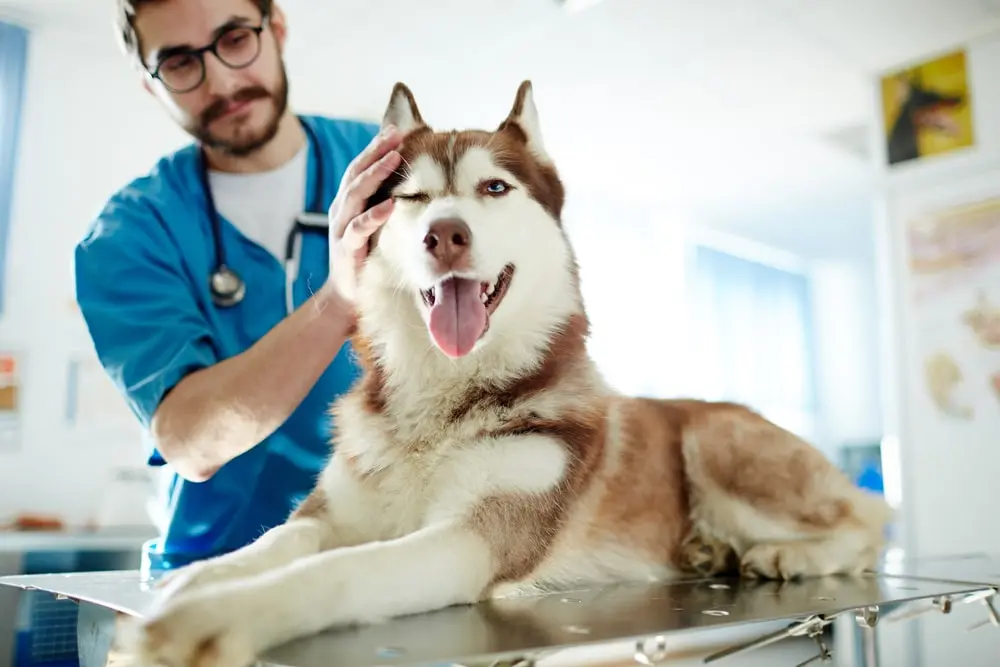PET HEALTH
Parvo Treatment Costs: What To Expect
Canine parvovirus (CPV) treatment costs can range from around $300 – $2,600 or more, depending on your dog’s specific needs.1 While parvo is a serious and highly contagious virus, vaccinating your pup when they’re young is one of the best ways to protect them from the disease.
However, if they do get sick, quick action and the right care can give them a strong chance of bouncing back. Pet insurance may be able to help with parvo vaccination, treatment, and recovery costs.
Protect Your Pup From Parvovirus With the Help of MetLife Pet Insurance
What Is Canine Parvovirus?
Canine parvovirus, also called CPV or parvo, is a highly contagious disease in dogs. It primarily affects puppies between 6 and 20 weeks old and unvaccinated adult dogs. The virus targets the dog’s gastrointestinal (GI) system and causes issues like severe vomiting, diarrhea, and dehydration.2
Parvo weakens a dog’s immune system and makes it harder for their body to fight off infections. In rare cases, it can also cause heart damage in very young puppies.2
Rest assured, parvo is preventable through vaccination and early treatment. Knowing the symptoms and how it spreads is essential to protecting your furry family.
What are the signs of parvo?
Parvovirus can come on quickly, but recognizing the signs early can help give your dog the best chance of recovery. Here’s what to watch out for:1,2
- Severe vomiting and diarrhea: These are often the most common symptoms, and the vomit or feces may contain blood.
- Lethargy: Your dog might seem unusually tired or unwilling to move.
- Loss of appetite: They may refuse to eat or lose interest in food.
- Bloating or abdominal pain: Your pup might show signs of discomfort, like whining or restlessness, or have a distended stomach.
- Fever or low body temperature: Parvo can cause a dog’s body temperature to spike or drop significantly.
- Dehydration: Watch for dry gums, excessive drooling, or sunken eyes, which can all indicate dehydration as a result of parvovirus.
Contact your vet if you notice any of these signs, so your pup gets the care they need as soon as possible.
How do dogs get parvo?
Parvo spreads through contact with infected dogs or contaminated environments. The virus is passed through stool and can linger in places like dog parks, kennels, and even shared items like food bowls or leashes. Puppies are more vulnerable because their immune systems are still developing, and they may not be fully vaccinated yet.2
Also, the virus can survive on surfaces for long periods and is immune to conditions like heat and cold.2 That’s why vaccinating your dog and keeping them away from high-risk areas until they’re fully protected can be one of the best ways to protect your pet.
How Much Does Parvo Treatment Cost?
Altogether, parvo tests and treatment can cost about $300 – $2,600.1 The largest expense is often hospitalization, especially if your dog needs multiple days of intensive care. However, if your vet thinks your dog can isolate and recover at home, the total cost will likely be lower.
Here’s how the diagnosis and treatment costs for parvo typically break down:
Parvo diagnosis costs
Diagnosing parvo starts with a simple fecal enzyme-linked immunosorbent assay (ELISA) test. This test detects parvovirus antigens in a sample of your dog’s stool and can deliver a result within minutes. The cost of the ELISA test usually ranges from $40 – $100.1
To get a full picture of your dog’s health, your vet might also recommend blood work, which can cost around $130. X-rays or ultrasounds might also be suggested to check your pup’s abdomen, which can add about $150 – $300 to your vet bill.1
Parvo treatment and recovery costs
Once your dog is diagnosed with parvo, they might need to stay in an animal hospital for specialized care and monitoring. Hospitalization is often the largest expense, but it gives your pup the round-the-clock support they need to recover. Here’s how the costs can add up:1
- Hospitalization: $600 per night
- Intravenous (IV) fluids: $220
- Anti-diarrheal medication: $10 – $15
- Anti-nausea medication: $10 – $20
- Antibiotics: $25 – $30
If your dog only needs one night in the hospital, you might expect to pay around $860. However, it’s common for dogs to stay three or more days to make sure they’re stable and on the mend. That puts the total costs closer to $2,600 or more.1
For milder cases, at-home care may be an option and can lower the overall cost of your dog’s parvo treatment. With guidance from your vet, you may be able to provide the necessary care to help your pup recover in a comfortable, familiar environment.
Parvo Vaccine Cost
A parvo vaccine costs between $75 and $100 for all three doses when they’re a puppy, and it’s one of the easiest ways to protect your dog from serious illnesses.3 If your dog is an adult receiving a single booster vaccine, the cost will likely be less. The parvo immunization is part of the DAPP vaccine and considered a “core vaccine” — it can help protect your puppy from distemper, adenovirus, parainfluenza, and parvovirus.
Puppies usually start getting the vaccine at 6 weeks old, with additional doses given every 2 – 4 weeks until they’re 16 weeks old. A booster shot is needed one year later, and after that, boosters are recommended every 1 – 3 years to keep your dog protected.
Vaccinating your dog is much cheaper than treating parvo, and it helps your dog avoid the stress and risks of battling the virus itself. By keeping up with their vaccine schedule, you’re giving your pup the chance to lead a healthy, happy life.
How MetLife Pet Insurance Can Help Cover Parvo Costs
Pet insurance can be beneficial when it comes to managing the costs of parvovirus. MetLife Pet’s dog insurance may help you cover expenses for things like hospital stays, diagnostic testing (such as the ELISA test), IV fluids, and medications. This can make treatment costs more manageable, so you can focus on helping your pup feel better.
Plus, MetLife Pet’s optional Preventive Care plan can help you cover vaccination costs — like the DAPP vaccine — which can protect your pup from serious illnesses, like parvovirus.
Protect Your Pup With Vaccines and Pet Insurance
Parvovirus is a serious, highly infectious disease, but it’s preventable with the DAPP vaccine. Staying current on your dog’s vaccinations is one of the best ways to keep them safe, and catching parvo early can make treatment more effective.
MetLife Pet Insurance plans can help you cover the cost of parvo treatment, including diagnostics, hospital stays, and preventive care — like vaccines — depending on your coverage. Ready to take on a personalized policy for your pup? Get your free quote today.



